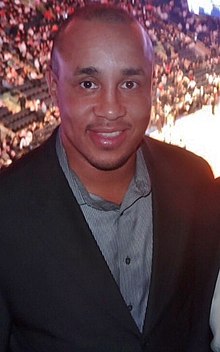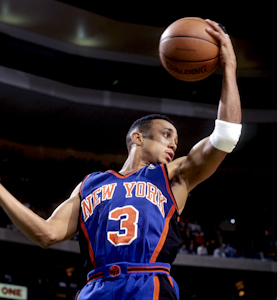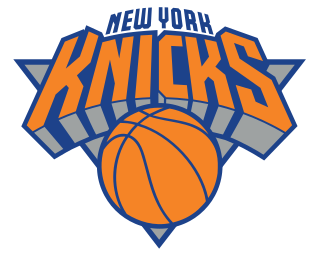
The New York Knickerbockers, more commonly referred to as the New York Knicks, are an American professional basketball team based in the New York City borough of Manhattan. The Knicks compete in the National Basketball Association (NBA) as a member of the Atlantic Division of the Eastern Conference. The team plays its home games at Madison Square Garden, an arena they share with the New York Rangers of the National Hockey League (NHL). They are one of two NBA teams located in New York City; the other team is the Brooklyn Nets. Alongside the Boston Celtics, the Knicks are one of two original NBA teams still located in its original city.
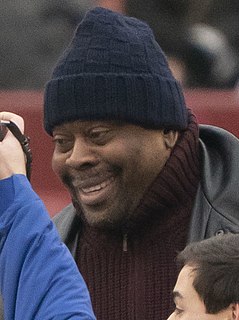
Patrick Aloysius Ewing is a Jamaican-American basketball coach and former professional player who is the head coach of the Georgetown University men's team. He played most of his career as the starting center for the New York Knicks of the National Basketball Association (NBA) before ending his playing career with brief stints with the Seattle SuperSonics and Orlando Magic.
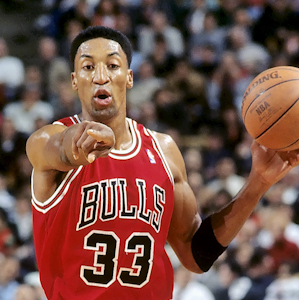
Scotty Maurice Pippen, usually spelled Scottie Pippen, is an American former professional basketball player. He played 17 seasons in the National Basketball Association (NBA), winning six NBA championships with the Chicago Bulls. Pippen, along with Michael Jordan, played an important role in transforming the Bulls into a championship team and in popularizing the NBA around the world during the 1990s.
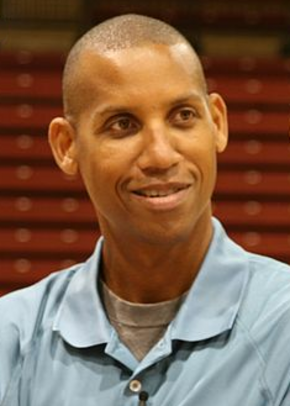
Reginald Wayne Miller is an American former professional basketball player who played his entire 18-year National Basketball Association (NBA) career with the Indiana Pacers. Miller was known for his precision three-point shooting, especially in pressure situations and most notably against the New York Knicks, for which he earned the nickname "Knick Killer." When he retired, he held the record for most career 3-point field goals made. He is currently second on the list behind Ray Allen. A five-time All-Star selection, Miller led the league in free throw accuracy five times and won a gold medal in the 1996 Summer Olympics.
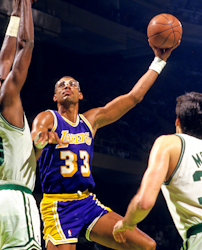
The center (C), also known as the five, or the big man, is one of the five positions in a basketball game. The center is normally the tallest player on the team, and often has a great deal of strength and body mass as well. In the NBA, the center is usually 6 feet 9 inches (2.06 m) or taller. They traditionally have played close to the basket in the low post.
Latrell Fontaine Sprewell is an American former professional basketball player who played for the Golden State Warriors, the New York Knicks, and the Minnesota Timberwolves in the NBA. During his basketball career, Sprewell received four NBA All-Star selections and an All-NBA First Team selection; he also helped lead the Knicks reach the 1999 NBA Finals and the Timberwolves to the 2004 Western Conference finals. Despite Sprewell's accomplishments, his career was overshadowed by a 1997 incident in which he choked then-Warriors coach P. J. Carlesimo during practice, which ultimately resulted in a 68-game suspension.

Allan Wade Houston is an American retired professional basketball player who played in the National Basketball Association (NBA) from 1993 to 2005. A shooting guard, Houston played nine seasons for the New York Knicks; he was a member of the Knicks' 1999 NBA Finals team. Houston made the NBA All-Star Team twice and also won a gold medal as a member of the U.S. men's basketball team at the 2000 Summer Olympics.
Gerald Bernard Wilkins is a retired American professional basketball player. He is a 6'6" shooting guard/small forward, who played collegiately at Moberly Area Community College and the University of Tennessee at Chattanooga before a career in the NBA.
Charlie Ward Jr. is an American retired professional basketball player, college football Heisman Trophy winner and Davey O'Brien Award winner and a National Basketball Association (NBA) player.
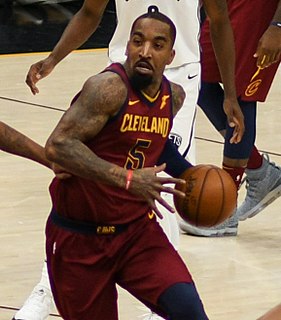
Earl Joseph "J. R." Smith III is an American professional basketball player who last played for the Los Angeles Lakers of the National Basketball Association (NBA). He played high school basketball at New Jersey basketball powerhouse Saint Benedict's Preparatory School in Newark. He entered the NBA out of high school after being selected in the first round of the 2004 NBA draft with the 18th overall pick by the New Orleans Hornets. He has also played for the Denver Nuggets and New York Knicks, as well as for the Zhejiang Golden Bulls of the Chinese Basketball Association. Smith has won two NBA Championships, with the Cavaliers in 2016 and with the Lakers in 2020.

The 1982 NCAA Division I Men's Basketball Tournament involved 48 schools playing in single-elimination play to determine the national champion of men's NCAA Division I college basketball. It began on March 11, 1982, and ended with the championship game on March 29 in the Louisiana Superdome in New Orleans, Louisiana. A total of 47 games were played.
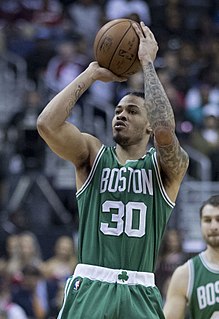
Gerald Green is an American professional basketball player. He was drafted by the Boston Celtics with the 18th overall pick in the 2005 NBA draft. Known for his dunking skill, he has performed well in many slam dunk competitions, having won the 2005 McDonald's All-American Slam Dunk Contest and the 2007 NBA Slam Dunk Contest, while finishing as the runner-up in the 2008 NBA Slam Dunk Contest.

The Heat–Knicks rivalry is a National Basketball Association (NBA) rivalry between the Miami Heat and New York Knicks. The two teams met in the NBA playoffs four years in a row from 1997–2000, with the Knicks winning three of those series and the Heat winning one. The teams most recently met in the first round of the 2012 NBA Playoffs, which the Heat won in five games.

The Bulls–Knicks rivalry is a rivalry between the Chicago Bulls and the New York Knicks of the National Basketball Association (NBA). The two basketball teams have played each other every year since the Bulls first joined the NBA in 1966.

The 1994 NBA Finals was the championship round of the National Basketball Association (NBA)'s 1993–94 season, and the culmination of the season's playoffs. The Western Conference champion Houston Rockets played the Eastern Conference champion New York Knicks for the championship, with the Rockets holding home-court advantage in the best-of-seven series. The Rockets defeated the Knicks 4 games to 3 to win the team's first NBA championship.
Anthony George Douglas Mason was an American professional basketball player. In his 13-year career he played with the New Jersey Nets, Denver Nuggets, New York Knicks, Charlotte Hornets, Milwaukee Bucks and Miami Heat of the National Basketball Association. He averaged 10.8 points and 8.3 rebounds in his 13-year NBA career. Mason earned the NBA Sixth Man of the Year Award in 1995 and led the NBA in minutes played in the following two seasons. In 1997, he was named to the All-NBA Third Team and the NBA All-Defensive Second Team. He was selected to the 2001 NBA All-Star Game. Mason was a member of the 1993-1994 New York Knicks team that reached the NBA Finals.
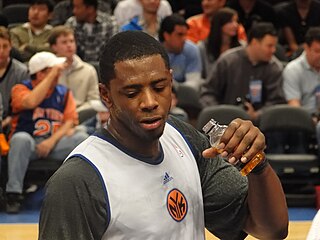
Patrick Aloysius Ewing Jr. is an American former professional basketball player. He is the eldest son of Hall of Fame basketball player and New York Knicks legend Patrick Ewing and Sharon Campbell. He has three brothers and three sisters.

The 1997 NBA playoffs was the postseason tournament of the National Basketball Association's 1996–97 season. The tournament concluded with the Eastern Conference champion Chicago Bulls defeating the Western Conference champion Utah Jazz 4 games to 2. This was the Bulls' second straight title, and fifth overall. Michael Jordan was named NBA Finals MVP for the fifth time.
The 1993 NBA Playoffs was the postseason tournament of the National Basketball Association's 1992–93 season. The tournament concluded with the Eastern Conference champion Chicago Bulls defeating the Western Conference champion Phoenix Suns 4 games to 2 in the NBA Finals. Michael Jordan was named NBA Finals MVP for the third straight year. This was the Suns' second Western Conference title; they made their first NBA Finals appearance since 1976, losing to the Boston Celtics.

The Knicks–Pacers rivalry is a basketball rivalry between the New York Knicks and the Indiana Pacers of the National Basketball League (NBA). The rivalry started in 1977 and quickly became one of the most bitter in NBA history. They met in the playoffs 6 times from 1993–2000, fueling a rivalry epitomized by the enmity between Pacer Reggie Miller and prominent Knick fan Spike Lee. Miller likened it to the Hatfield–McCoy feud, and The New York Times said in 1998 that it was "as combustible as any in the league".
